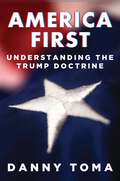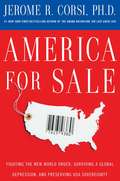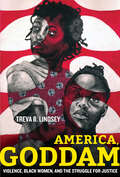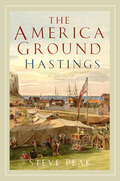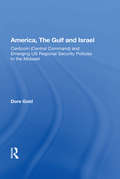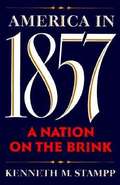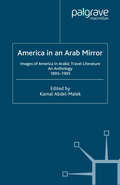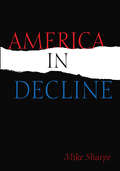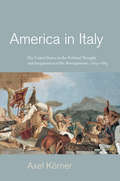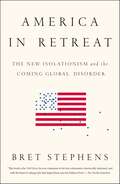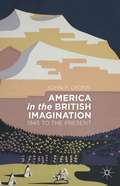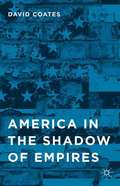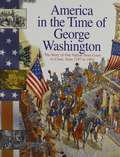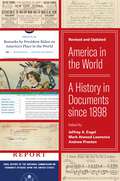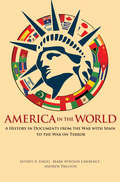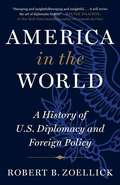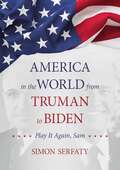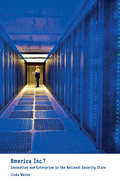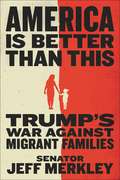- Table View
- List View
America First: Understanding the Trump Doctrine
by Danny TomaDonald Trump, Statesman? Critics dismissed the idea out of hand. Even his fans questioned whether President Trump could do what other presidents had considered impossible. But in less than two years, Trump has: - Put North Korea on the path to de-nuclearization and peace with South Korea. - Destroyed the "state" of the Islamic State. - Forged a de facto alliance between Saudi Arabia and Israel. - Doled out real punishment - not empty threats - for Syria's use of chemical weapons. -Re-negotiated international trade deals on terms more favorable to the United States. President Donald Trump's foreign policy successes have stunned not just his critics, but the world. Now Danny Toma, a State Department veteran, explains how Trump has done it, what the Trump Doctrine entails, and how it can- and likely will - continue to succeed. As Toma demonstrates, President Trump has restored American foreign policy to its traditional moorings, which anchored such "realist" presidents as George Washington, Dwight Eisenhower, and Ronald Reagan, who put American interests first, avoided unnecessary foreign entanglements, and pursued peace through strength. That foreign policy tradition made America great and, under President Trump's leadership, is making America great again. When America has strayed from those principles - especially as witnessed in the foreign policies of such "idealist" presidents as Jimmy Carter, Bill Clinton, George W. Bush, and Barak Obama - the results have been expensive in lives, treasure, and even international retreat. Provacative, thorough, and engagingly written, Danny Toma's America First is the one book you need to understand how America can again lead the world and protect her own interests.
America for Sale
by Jerome R CorsiA RESOUNDING CALL TO DEFEND AMERICA'S SOVEREIGNTY AND SAVE OUR NATION FROM GLOBAL ECONOMIC TAKEOVER-- FROM THE #1 NEW YORK TIMES BESTSELLING AUTHOR OF THE OBAMA NATION AND THE LATE GREAT US Between George H. W. Bush's "new world order" and the unprecedented governmental growth and massive redistribution of wealth under President Barack Obama, the United States risks losing the greatest middle class ever created in the history of the world. In this groundbreaking New York Times bestseller, Dr. Jerome R. Corsi blows the whistle on a movement to undercut the fundamental principles of limited government that our Founding Fathers fought for and died for trying to establish. While the radical Left promotes socialism and the radical Right champions unbridled free trade, valuable jobs are being outsourced, our national borders erased, and our dollar destroyed before our very eyes. With constructive solutions for resisting the global New Deal, reversing our dependence on foreign oil, and strengthening our middle class, Corsi shares important and practical strategies to help American families survive. The United States can be a major player in the world economy without sacrificing our sovereignty, the strength of our national domestic economy, or the dollar. America is for sale--unless taxpayers stand up and say "NO!" to the globalist political agenda that threatens our great nation's freedom. m.
America, Goddam: Violence, Black Women, and the Struggle for Justice
by Treva B. LindseyA powerful account of violence against Black women and girls in the United States and their fight for liberation.America, Goddam explores the combined force of anti-Blackness, misogyny, patriarchy, and capitalism in the lives of Black women and girls in the United States today. Through personal accounts and hard-hitting analysis, Black feminist historian Treva B. Lindsey starkly assesses the forms and legacies of violence against Black women and girls, as well as their demands for justice for themselves and their communities. America, Goddam powerfully demonstrates that the struggle for justice begins with reckoning with the pervasiveness of violence against Black women and girls in the United States. Combining history, theory, and memoir, America, Goddam renders visible the gender dynamics of anti-Black violence. Black women and girls occupy a unique status of vulnerability to harm and death, while the circumstances and traumas of this violence go underreported and understudied. Lindsey also shows that the sanctity of life and liberty for Black men has been a galvanizing rallying cry within Black freedom movements. But Black women—who have been both victims of anti-Black violence as well as frontline participants in it, and quite often architects of these freedom movements—are rarely the focus. Black women have led movements demanding justice for Breonna Taylor, Sandra Bland, Toyin Salau, Riah Milton, Aiyana Stanley-Jones, and countless other Black women and girls whose lives have been curtailed by numerous forms of violence. Across generations and centuries, their refusal to remain silent about violence against them led many to envisioning and building toward Black liberation through organizing and radical politics. Echoing the energy of Nina Simone's searing protest song that inspired the title, America, Goddam is a call to action in our collective journey toward just futures.
The America Ground, Hastings
by Steve PeakThe America Ground: 8½ acres of Hastings town centre that in the early nineteenth century was an open section of beach, apparently beyond the borough boundary and with no obvious owner. Free from the rules of local authority and taxes, this almost lawless area was gradually occupied by a thousand or more people, many of them squatters, who lived and worked there – until they were all evicted by the government in 1835. This is the story of that beach, which became almost ‘independent’ of the ancient town (like America had of England), but ultimately played a crucial role in expanding the old fishing port into a modern seaside resort.
America, The Gulf, And Israel: Centcom (central Command) And Emerging U.s. Regional Security Policies In The Middle East
by Dare GoldThis book evaluates whether the military preparations made by US in the aftermath of Central Command's (CENTCOM) establishment, represent the kind of change in America's military relationship with the Middle East. It also evaluates the implications of the creation of CENTCOM for US-Israel relations.
America in 1857: A Nation on the Brink
by Kenneth StamppIt was a year packed with unsettling events. The Panic of 1857 closed every bank in New York City, ruined thousands of businesses, and caused widespread unemployment among industrial workers. The Mormons in Utah Territory threatened rebellion when federal troops approached with a non-Mormon governor to replace Brigham Young. The Supreme Court outraged northern Republicans and abolitionists with the Dred Scott decision ("a breathtaking example of judicial activism"). And when a proslavery minority in Kansas Territory tried to foist a proslavery constitution on a large antislavery majority, President Buchanan reneged on a crucial commitment and supported the minority, a disastrous miscalculation which ultimately split the Democratic party in two. In America in 1857 , eminent American historian Kenneth Stampp offers a sweeping narrative of this eventful year, covering all the major crises while providing readers with a vivid portrait of America at mid-century. Stampp gives us a fascinating account of the attempt by William Walker and his band of filibusters to conquer Nicaragua and make it a slave state, of crime and corruption, and of street riots by urban gangs such as New York's Dead Rabbits and Bowery Boys and Baltimore's Plug Uglies and Blood Tubs. But the focus continually returns to Kansas. He examines the outrageous political frauds perpetrated by proslavery Kansans, Buchanan's calamitous response and Stephen Douglas's break with the President (a rare event in American politics, a major party leader repudiating the president he helped elect), and the whirl of congressional votes and dramatic debates that led to a settlement humiliating to Buchanan--and devastating to the Democrats. 1857 marked a turning point, at which sectional conflict spun out of control and the country moved rapidly toward the final violent resolution in the Civil War. Stampp's intensely focused look at this pivotal year illuminates the forces at work and the mood of the nation as it plummeted toward disaster.
America in An Arab Mirror: Images of America in Arabic Travel Literature: An Anthology
by K. Abdel-MalekThis distinguished anthology presents for the first time in English travel essays by Arabic writers who have visited America in the second half of the century. The view of America which emerges from these accounts is at once fascinating and illuminating, but never monolithic. The writers hail from a variety of viewpoints, regions, and backgrounds, so their descriptions of America differently engage and revise Arab pre-conceptions of Americans and the West. The country figures as everything from the unchanging Other, the very antithesis of the Arab self, to the seductive female, to the Other who is both praiseworthy and reprehensible.
America in Decline
by Leon Sharpe"This collection gathers 91 essays that appeared in the pages of Challenge from 1973 through 2011."
America in Italy: The United States in the Political Thought and Imagination of the Risorgimento, 1763-1865
by Axel KörnerAmerica in Italy examines the influence of the American political experience on the imagination of Italian political thinkers between the late eighteenth century and the unification of Italy in the 1860s. Axel Körner shows how Italian political thought was shaped by debates about the American Revolution and the U.S. Constitution, but he focuses on the important distinction that while European interest in developments across the Atlantic was keen, this attention was not blind admiration. Rather, America became a sounding board for the critical assessment of societal changes at home.Many Italians did not think the United States had lessons to teach them and often concluded that life across the Atlantic was not just different but in many respects also objectionable. In America, utopia and dystopia seemed to live side by side, and Italian references to the United States were frequently in support of progressive or reactionary causes. Political thinkers including Cesare Balbo, Carlo Cattaneo, Giuseppe Mazzini, and Antonio Rosmini used the United States to shed light on the course of their nation's political resurgence. Concepts from Montesquieu, Rousseau, and Vico served to evaluate what Italians discovered about America. Ideas about American "domestic manners" were reflected and conveyed through works of ballet, literature, opera, and satire.Transcending boundaries between intellectual and cultural history, America in Italy is the first book-length examination of the influence of America's political formation on modern Italian political thought.
America in Retreat
by Bret Stephens"A world in which the leading liberal-democratic nation does not assume its role as world policeman will become a world in which dictatorships contend, or unite, to fill the breach. Americans seeking a return to an isolationist garden of Eden--alone and undisturbed in the world, knowing neither good nor evil--will soon find themselves living within shooting range of global pandemonium."--From the Introduction In a brilliant book that will elevate foreign policy in the national conversation, Pulitzer Prize-winning columnist Bret Stephens makes a powerful case for American intervention abroad. In December 2011 the last American soldier left Iraq. "We're leaving behind a sovereign, stable, and self-reliant Iraq," boasted President Obama. He was proved devastatingly wrong less than three years later as jihadists seized the Iraqi city of Mosul. The event cast another dark shadow over the future of global order--a shadow, which, Bret Stephens argues, we ignore at our peril. America in Retreat identifies a profound crisis on the global horizon. As Americans seek to withdraw from the world to tend to domestic problems, America's adversaries spy opportunity. Vladimir Putin's ambitions to restore the glory of the czarist empire go effectively unchecked, as do China's attempts to expand its maritime claims in the South China Sea, as do Iran's efforts to develop nuclear capabilities. Civil war in Syria displaces millions throughout the Middle East while turbocharging the forces of radical Islam. Long-time allies such as Japan, Saudi Arabia, and Israel, doubting the credibility of American security guarantees, are tempted to freelance their foreign policy, irrespective of U.S. interests. Deploying his characteristic stylistic flair and intellectual prowess, Stephens argues for American reengagement abroad. He explains how military intervention in Iraq and Afghanistan was the right course of action, foolishly executed. He traces the intellectual continuity between anti-interventionist statesmen such as Henry Wallace and Robert Taft in the late 1940s and Barack Obama and Rand Paul today. And he makes an unapologetic case for Pax Americana, "a world in which English is the default language of business, diplomacy, tourism, and technology; in which markets are global, capital is mobile, and trade is increasingly free; in which values of openness and tolerance are, when not the norm, often the aspiration." In a terrifying chapter imagining the world of 2019, Stephens shows what could lie in store if Americans continue on their current course. Yet we are not doomed to this future. Stephens makes a passionate rejoinder to those who argue that America is in decline, a process that is often beyond the reach of political cures. Instead, we are in retreat--the result of faulty, but reversible, policy choices. By embracing its historic responsibility as the world's policeman, America can safeguard not only greater peace in the world but also greater prosperity at home. At once lively and sobering, America in Retreat offers trenchant analysis of the gravest threat to global order, from a rising star of political commentary.
America in Search of Itself (Making of the President Ser. #5): The Making of the President 1956-1980
by Theodore H. WhiteAll of us have lived through a time of collision in America: of upheavals shattering old ideas and dreams-- transforming American politics in the process. In this, the last of his prize-winning series on American presidential politics, Theodore H. White tells us of the dramas that lie behind that transformation. He sets the stage by describing the forces that have changed American politics in the twenty-five years of his reporting. He tells how American goodwill created something called the Great Society... and pushed it over the cliff. He reveals how television took over American politics--and changed its nature; and he tells the terrifying story of the Great Inflation--and how it came to undermine all American life. And he details the equally disturbing story of how Americans have been ripped apart, divided and set against each other by the hopes that inspired men of goodwill to try to bring Americans together.
America in the British Imagination
by John F. LyonsHow was American culture disseminated into Britain? Why did many British citizens embrace American customs? And what picture did they form of American society and politics? This engaging and wide-ranging history explores these and other questions about the U. S. 's cultural and political influence on British society in the post-World War II period.
America in the Shadow of Empires
by David CoatesThe focus of the book is the cost of empire, particularly the cost in the American case the internal burden of American global leadership. The book builds an argument about the propensity of external responsibilities to undermine the internal strength, raising the question of the link between weakening and the global spread of American power. "
America in the Time of Franklin Delano Roosevelt, 1929-1948
by Sally Senzell Isaacs<P>America in the Time of... helps readers explore our nation's past by focusing on key figures in history. Each visually stunning spread features clearly written text that explains the social, political, and economic realities of the time. The series visits all areas of the United States from coast to coast, and offers information about the native as well as invading and immigrant peoples. Each book features: <br>-- beautiful reconstruction artwork, <br>-- authentic primary source photographs, <br>-- detailed maps, both modern and historical, <br>-- profiles of famous people who shaped that time, <br>-- a list of noteworthy places, and <br>-- a bibliography of fiction books to extend learning.
America in the Time of George Washington, 1747 to 1803
by Sally Senzell IsaacsBuilding a new nation is far from easy. Meet Americans such as George Washington, Thomas Jefferson, and Benjamin Franklin. Also learn about the groups, such as Native Americans, African Americans, and others.
America in the World
by Frank Costigliola Michael J. HoganThis volume includes historiographical surveys of American foreign relations since 1941 by some of the country's leading historians. Some of the essays offer sweeping overviews of the major trends in the field of foreign/international relations history. Others survey the literature on US relations with particular regions of the world or on the foreign policies of presidential administrations. The result is a comprehensive assessment of the historical literature on US foreign policy that highlights recent developments in the field.
America in the World: A History in Documents since 1898, Revised and Updated
by Jeffrey A. Engel, Mark Atwood Lawrence, and Andrew PrestonA wide-ranging anthology of primary texts in American foreign relations—now expanded to include documents from the Trump years to todayHow should America wield its power beyond its borders? Should it follow grand principles or act on narrow self-interest? Should it work in concert with other nations or avoid entangling alliances? America in the World captures the voices and viewpoints of some of the most provocative, eloquent, and influential people who participated in these and other momentous debates. Now fully revised and updated, this anthology brings together primary texts spanning a century and a half of U.S. foreign relations, illuminating how Americans have been arguing about the nation&’s role in the world since its emergence as a world power in the late nineteenth century.Features more than 250 primary-source documents, reflecting an extraordinary range of viewsIncludes two new chapters on the Trump years and the return of great power rivalries under BidenSweeps broadly from the Gilded Age to emerging global challenges such as COVID-19Shares the perspectives of presidents, secretaries of state, and generals as well as those of poets, songwriters, clergy, newspaper columnists, and novelistsAlso includes non-American perspectives on U.S. power
America in the World: A History in Documents from the War with Spain to the War on Terror (America in the World #14)
by Jeffrey A. Engel, Mark Atwood Lawrence and Andrew PrestonA one-of-a-kind anthology of primary texts in American foreign relationsHow should America wield its enormous power beyond its borders? Should it adhere to grand principles or act on narrow self-interest? Should it partner with other nations or avoid entangling alliances? Americans have been grappling with questions like these throughout the nation's history, and especially since the emergence of the United States as a major world power in the late nineteenth century. America in the World illuminates this history by capturing the diverse voices and viewpoints of some of the most colorful and eloquent people who participated in these momentous debates.Spanning the era from the Gilded Age to the Obama years, this unique reader collects more than two hundred documents—everything from presidential addresses and diplomatic cables to political cartoons and song lyrics. It encompasses various phases of American diplomatic history that are typically treated separately, such as the First World War, the Cold War, and 9/11. The book presents the perspectives of elite policymakers—presidents, secretaries of state, generals, and diplomats—alongside those of other kinds of Americans, such as newspaper columnists, clergymen, songwriters, poets, and novelists. It also features numerous documents from other countries, illustrating how foreigners viewed America&’s role in the world.Ideal for classroom use, America in the World sheds light on the complex interplay of political, economic, ideological, and cultural factors underlying the exercise of American power on the global stage.Includes more than two hundred documents from the late nineteenth century to todayLooks at everything from presidential addresses to political cartoons and song lyricsPresents diverse perspectives, from elite policymakers to clergymen and novelistsFeatures documents from outside the United States, illustrating how people in other countries viewed America&’s role in the world
America in the World: A History of U.S. Diplomacy and Foreign Policy
by Robert B. ZoellickAmerica has a long history of diplomacy–ranging from Benjamin Franklin, Alexander Hamilton, and Thomas Jefferson to Henry Kissinger, Ronald Reagan, and James Baker–now is your chance to see the impact these Americans have had on the world. Recounting the actors and events of U.S. foreign policy, Zoellick identifies five traditions that have emerged from America's encounters with the world: the importance of North America; the special roles trading, transnational, and technological relations play in defining ties with others; changing attitudes toward alliances and ways of ordering connections among states; the need for public support, especially through Congress; and the belief that American policy should serve a larger purpose. These traditions frame a closing review of post-Cold War presidencies, which Zoellick foresees serving as guideposts for the future.Both a sweeping work of history and an insightful guide to U.S. diplomacy past and present, America in the World serves as an informative companion and practical adviser to readers seeking to understand the strategic and immediate challenges of U.S. foreign policy during an era of transformation.
America in the World from Truman to Biden: Play it Again, Sam
by Simon SerfatyDoes America still count in the world? Can the world still count on America? In raising such questions halfway into a series of systemic shocks that began in September 2001, Simon Serfaty, a long-time scholar of international politics, reminds Americans that their country’s well-being and that of the world are intertwined. Play it again, Sam: History is in a foul mood again, and this is no time to come home and leave behind an unfinished European Union facing the ghosts of a revanchist Russia still claiming the Old World as its own; a strategic dark hole in the Greater Middle East, on the eve of a global Sarajevo moment; and China’s surging hegemonic power in a continent fraught with too much history and too little geography. Admittedly, what is good for America may no longer be best for all the West, and what is good for the West may no longer be good for much of the Rest: the unipolar moment is irreversibly over. Yet, writing in an elegant style and with much historical insight, Serfaty argues that even with the old power map irreversibly gone, mainly to the benefit of the non-Western world, a new world order for the twenty-first century will remain dependent on the U.S. role, its capabilities and its efficacy, as well as its leadership and its purpose.
America In The Time Of Abraham Lincoln: 1815 to 1869
by Sally Senzell IsaacsUses the life of Abraham Lincoln as a reference to examine the history of the United States from 1815 to 1869.
America, Inc.: Who Owns and Operates the United States
by Jerry S. Cohen Morton Mintz"This well-documented expose' reveals the incorporated rulers of the United States and, indeed, much of the world. It shows them to be private governments which, as effectively as legitimate public governments, decide whether large numbers of us live or die. They levy taxes in the form of price increases, unrestrained by competition. They manipulate legitimate governments, turning nations into welfare states for corporations. And they are generally only responsible to themselves. Thus the citizen is powerless while the conglomerates enforce private socialism and decry public socialism. The authors propose an alternate solution to this seemingly powerless situation."
America Inc.?: Innovation and Enterprise in the National Security State
by Linda WeissFor more than half a century, the United States has led the world in developing major technologies that drive the modern economy and underpin its prosperity. In America, Inc., Linda Weiss attributes the U.S. capacity for transformative innovation to the strength of its national security state, a complex of agencies, programs, and hybrid arrangements that has developed around the institution of permanent defense preparedness and the pursuit of technological supremacy. She examines how that complex emerged and how it has evolved in response to changing geopolitical threats and domestic political constraints, from the Cold War period to the post-9/11 era.Weiss focuses on state-funded venture capital funds, new forms of technology procurement by defense and security-related agencies, and innovation in robotics, nanotechnology, and renewable energy since the 1980s. Weiss argues that the national security state has been the crucible for breakthrough innovations, a catalyst for entrepreneurship and the formation of new firms, and a collaborative network coordinator for private-sector initiatives. Her book appraises persistent myths about the military-commercial relationship at the core of the National Security State. Weiss also discusses the implications for understanding U.S. capitalism, the American state, and the future of American primacy as financialized corporations curtail investment in manufacturing and innovation.
America Invulnerable: The Quest for Absolute Security from 1812 to Star Wars
by Caleb Carr James ChaceSurvey of our foreign policy through the 1980's.
America Is Better Than This: Trump's War Against Migrant Families
by Jeff MerkleyAn exposé and cry of outrage at the cruelty and chaos the Trump administration has wrought at the border with child separations, border blockades, and a massive gulag of child prisons housing thousands. p.p1 {margin: 0.0px 0.0px 0.0px 0.0px; font: 12.0px 'Times New Roman'} p.p2 {margin: 0.0px 0.0px 0.0px 0.0px; text-indent: 36.0px; font: 12.0px 'Times New Roman'} Jeff Merkley couldn't believe his eyes. He never dreamed the United States could treat vulnerable young families with such calculated brutality. Few had witnessed what Merkley discovered just by showing up at the border and demanding to see what was going on behind closed doors.Contrary to the official stories and soothing videos, he found mothers and children, newborn babies and infants, stranded for days on border bridges in blistering heat or locked up in ice-cold holding pens. There were nearly 1,500 boys jammed into a former Walmart, a child tent prison in the desert with almost 3,000 boys and girls, and children struggling to survive in gang-filled Mexican border towns after they were blocked from seeking asylum in the United States.Worst of all, there were the children ripped out of their parents' arms and sorted into cages in some profoundly warped attempt to discourage migration. This was how the Trump administration treated the child victims of unspeakable violence that had driven them from their homes: as pawns in a power play rather than as humans worthy of respect and dignity.It was Merkley's visits -- captured live on viral video -- that triggered worldwide outrage at the forced separation of children from their parents. Just by taking an interest -- by caring about the people legally claiming asylum at America's borders -- Merkley helped expose the Trump administration's war on migrant families. Along the way, he helped turn the tide against some of its worst excesses.AMERICA IS BETTER THAN THIS tells the inside story of how one senator, with no background as an immigration activist, became a leading advocate for reform of the brutal policies that have created a humanitarian crisis on the southern U.S. border. It represents the heartfelt and candid voice of a concerned American who believes his country stands for something far bigger and better.
